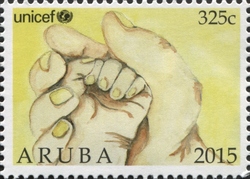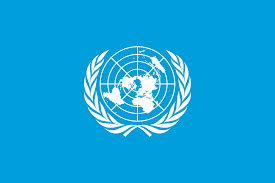Stamp: UNICEF 2015 (Aruba 2015)
UNICEF 2015 (Aruba 2015)
25 March (Aruba ) within release UNICEF 2015 goes into circulation Stamp UNICEF 2015 face value 3.25 Aruban florin
| Stamp UNICEF 2015 in catalogues | |
|---|---|
| WADP Numbering System - WNS: | WAD:AW018.15 |
Stamp is horizontal format.
Also in the issue UNICEF 2015:
- Stamp - UNICEF 2015 face value 2.25;
- Stamp - UNICEF 2015 face value 2.50;
- Stamp - UNICEF 2015 face value 3.25;
- Stamp - UNICEF 2015 face value 3.50;
|
Data entry completed
80%
|
|
|---|---|
| Stamp UNICEF 2015 in digits | |
| Country: | Aruba |
| Date: | 2015-03-25 |
| Size: | 36 x 26 |
| Perforation: | 14 by 14 |
| Format: | Stamp |
| Face Value: | 3.25 Aruban florin |
Stamp UNICEF 2015 it reflects the thematic directions:
The United Nations (UN) is a diplomatic and political international organization with the intended purpose of maintaining international peace and security, developing friendly relations among nations, achieving international cooperation, and serving as a center for coordinating the actions of member nations. It is widely recognised as the world's largest international organization. The UN is headquartered in New York City, in international territory with certain privileges extraterritorial to the United States, and the UN has other offices in Geneva, Nairobi, Vienna, and The Hague, where the International Court of Justice is headquartered at the Peace Palace.
Humans (Homo sapiens, meaning "thinking man") or modern humans are the most common and widespread species of primate, and the last surviving species of the genus Homo. They are great apes characterized by their hairlessness, bipedalism, and high intelligence. Humans have large brains, enabling more advanced cognitive skills that enable them to thrive and adapt in varied environments, develop highly complex tools, and form complex social structures and civilizations. Humans are highly social, with individual humans tending to belong to a multi-layered network of cooperating, distinct, or even competing social groups – from families and peer groups to corporations and political states. As such, social interactions between humans have established a wide variety of values, social norms, languages, and traditions (collectively termed institutions), each of which bolsters human society. Humans are also highly curious, with the desire to understand and influence phenomena having motivated humanity's development of science, technology, philosophy, mythology, religion, and other frameworks of knowledge; humans also study themselves through such domains as anthropology, social science, history, psychology, and medicine. There are estimated to be more than eight billion living humans.
Biologically, a child (plural: children) is a human being between the stages of birth and puberty. The legal definition of child generally refers to a minor, otherwise known as a person younger than the age of majority. Child may also describe a relationship with a parent (such as sons and daughters of any age) or, metaphorically, an authority figure, or signify group membership in a clan, tribe, or religion; it can also signify being strongly affected by a specific time, place, or circumstance, as in "a child of nature" or "a child of the Sixties". There are many social issues that affect children, such as childhood education, bullying, child poverty, dysfunctional families, child labor, hunger, and child homelessness. Children can be raised by parents, by fosterers, guardians or partially raised in a day care center.


